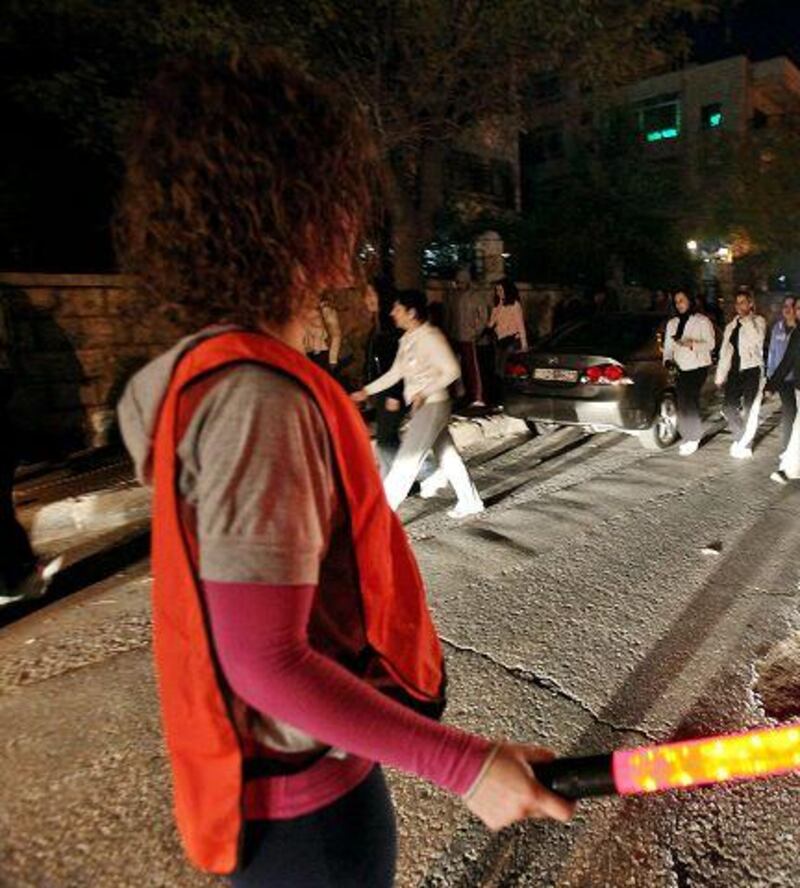AMMAN // Mowaffaq Maraqa blew his whistle and shouted to a group of walkers who swarmed Amman's streets one night last week. "Walk to the left!" he said, instructing them to walk facing oncoming traffic, in line with safety precautions of walking outdoors.
The Fastwalk Group, whch Mr Maraqa founded 3½ years ago through Facebook, is growing so rapidly that it is becoming difficult to control in a country where pavements are not pedestrian-friendly and speeding motorists are responsible for killing one person every nine hours on the road. But for Mr Maraqa, a 41-year-old civil engineer, it is definitely worth the trouble. He has been trying to promote fast walking in the country, hoping to instil healthy lifestyles among Jordanians.
"I am trying to encourage a culture of fast walking in Jordan," he said. "It is not only for the health benefits, but it also has psychological advantages. It makes people happier, as their happy hormones start flowing after the walk. Fast walking also clears their minds and releases negative energy." Those who exercise in Jordan often use gyms, but walking outdoors is not a part of Jordanian culture, let alone walking in groups. Pedestrians too often complain that the pavements are narrow, or have electricity poles or trees in the middle and even cars parked on them, leaving little room to manoeuvre. In some areas, there are no pavements at all.
In addition, as urban sprawl grows there are more cars on the road and pedestrian crossings are ignored. Under Jordanian law, pedestrians do have rights, however: when they are run over, it is the driver's fault. Khaled Nouri, a 55-year-old businessman, joined the Fastwalk Group two months ago. "It is difficult to walk in Amman, but it feels safer to walk with a group," he said. "I am usually lazy and a smoker. I haven't exercised since 1977. It is an achievement for me to walk. I am doing my best to continue walking with them."
Until the beginning of this year, the Fastwalk Group included 300 members. When it got media exposure on local television last February and then Al Jazeera in August, the number of walkers swelled to nearly 1,200. The membership on the group's Facebook page reached 2,123 and dozens of others are still pending. "It is contagious and addictive," Mr Maraqa said. Farah Kanan, 24, joined the group in October after being convinced by friends who are members. "I never liked sports, but when I tried walking it was great. When we walked uphill it was much more difficult," she said of her first time. "But the advantage of walking with such a crowd is that you forget your pain and just enjoy the walk.
"My muscles ached for three days afterwards, but it has really inspired me and helped change my lifestyle," she said. "I haven't missed one walk since the day I started - Then, I decided to get the most of the walking experience by enjoying the simple flow of walking to open my mind. Honestly, the revelations I discovered during the walk set me free." Twice a week, the group walks one of a number of 12km routes, which are posted on Facebook before the walk. The size of the groups vary from walk to walk, but often there are several hundred people and as many as 1,200 participated in a recent excursion.
"People have the chance to get more acquainted with their city and venture into places they did not get the chance to see before. It strengthens their sense of belonging," Mr Maraqa said. There are also rules to follow. Fastwalkers are not allowed to wear flimsy shoes or jeans when they walk. They have to wear proper sports outfits and trainers. Smoking is prohibited. They also have to follow safety precautions, including wearing bright outfits or vests.
"The challenge is to change social habits - It is a constant battle to convince people to remain committed," Mr Maraqa said. The Fastwalk Group members range in age from their 20s to 60s. Many women find the group appealing because they feel safer walking in groups. Manal Nayfeh, 28, joined the group in July. "Roads are dangerous to walk in because of the speedy cars," she said. "But there is safety in numbers. Besides, it is fun walking with a group and I feel relaxed afterwards."
Her friend Dana said though she used to walk by herself once a week for two hours, it was not comfortable because of the frequent lewd remarks and shouts from men. "I usually have music on when I walk so that I will avoid hearing people's comments. But as everybody walks together, I feel immune." Some walkers are already feeling the difference. In the past month, Lana Hyari, 48, said she quit walking at a private club and joined the Fastwalk Group.
Six years ago, she was told she had breast cancer. The treatments increased her cholesterol levels and caused her arthritis. As a result, she stopped taking medication last year. "I like walking, and my husband really encourages me a lot. Now I walk with the group for two hours twice a week. It is really helping me and I feel better. It boosts my mood," she said. "In one month, I already feel shaped up. I also lost 2kg. Next week I am going to test my cholesterol level."
smaayeh@thenational.ae





